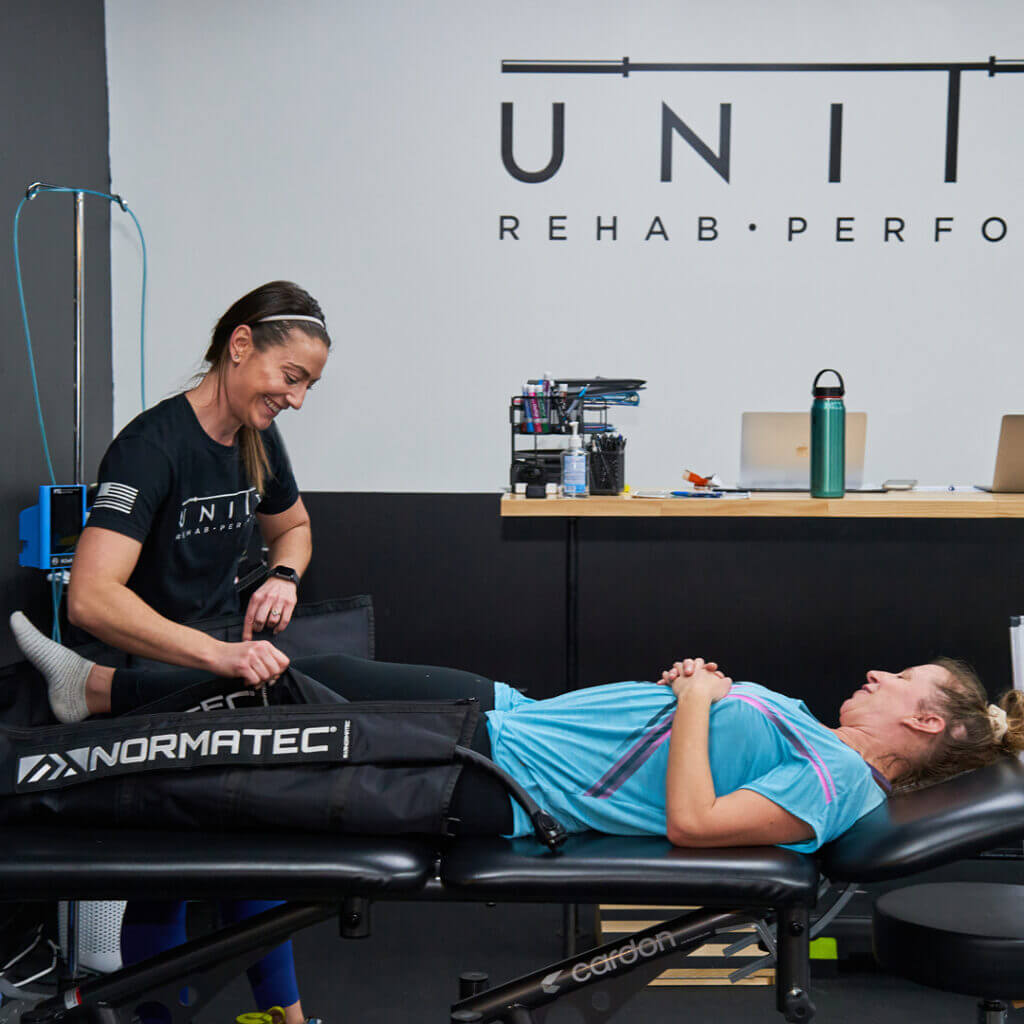
UNITE.rehab.perform
Denver's Best Sports Physical Therapy
Athlete Recovery: Sleep

Performance Athletes & Sleep
- Obtain anything less than eight hours of sleep a night, and especially less than six hours a night, and the following happens:
- – Time to physical exhaustion drops by 10 to 30 percent
- – Aerobic output is significantly reduced.
- – Lowered vertical jump height,
- – Decreases in peak and sustained muscle strength.
- – Faster rates of lactic acid buildup.
- – Reductions in blood oxygen saturation.
- – Increases in blood carbon dioxide, due in part to a reduction in the amount of air that the lungs can expire.
- – Decreased ability of the body to cool itself during physical exertion through sweating – a critical part of peak performance – is impaired by sleep loss.
Post-performance sleep:
- – Accelerates physical recovery from common inflammation.
- – Stimulates muscle repair.
- – Restocks cellular energy in the form of glucose and glycogen
- – Three full nights of recovery sleep (i.e., more nights than a weekend) are insufficient to restore performance back to normal levels after a week of short sleeping.
- – The less you sleep, the shorter your life span.
- – Consequently, the more you sleep, the longer your lifespan.
- – Sleep is the most effective thing we can do to reset our brain and body health each day.
- – REM (Rapid Eye Movement) sleep exquisitely recalibrates and fine-tunes the emotional circuits of the human brain. It’s also the type of sleep where most of your dreaming takes place.
- – Did you know that during REM sleep your muscles become paralyzed so you don’t act out your dreams?
- – REM sleep helps your brain consolidate and process new information. This information is then retained in your long-term memory.
- – REM sleep helps to ensure better mental concentration and mood regulation.
- – Alcohol is one of the most powerful suppressors of REM sleep that we know of.
- – Any individual, no matter what age, will exhibit physical ailments, mental health instability, reduced alertness, and impaired memory if their sleep is chronically disrupted.
- – Sleep has proven itself time and again as a memory aid: both before learning, to prepare your brain for initially making new memories, and after learning, to cement those memories and prevent forgetting.
- – Humans need more than seven hours of sleep each night to maintain cognitive performance. After ten days of just seven hours of sleep, the brain is as dysfunctional as it would be after going without sleep for twenty-four hours.
- – Sleep deprivation vastly increases your likelihood of infection, and reduces your response to flu vaccine.
- – Poor and insufficient sleep is linked to lower testosterone levels….
- – Limiting sleep to 5 hours a night for one week results in a tremendous drop in testosterone. A lack of sleep blunts this crucial hormone so much that researchers estimate it ages a man by 5 to 10 years!
Things You Can Do To Get Better Sleep
- – Develop a sleep routine that you follow every night. It will signal to your brain that it’s time to sleep.
- – Go to bed at the same time every night
- – No screen time two hours before bed. If you need to be in front of a screen, invest in a pair of blue light blocking glasses. The blue light from electronic devices blunts the secretion of melatonin by 50%. Melatonin is a hormone necessary for sleep. Look for lenses that block blue light in the wavelength of 400 – 500 nm (nanometers)
- – Dim the lights in the home a few hours before bedtime, or if you need to be up consider using red lights.
- – Avoid naps after 3pm
- – Try to get outside for 30 minutes a day and spend time in the sun. Mornings are best for this.
- – Relax before bedtime.
- – Avoid large meals and beverages late at night.
- – Avoid caffeine.
- – Avoid alcohol before bed. It suppresses REM sleep and fragments your night’s rest, meaning you’ll wake briefly many times during the night.
- – Cool the room that you sleep in. 65 degrees Fahrenheit works for most people. A cool environment signals the brain that the day is over (the sun goes down and it gets cooler….it’s been happening for a few billion years) and it’s time for some shut eye.
- – Get the room that you sleep in as dark as possible. Black out curtains work great for this.
- – Run a hot bath and soak. The warm water will bring blood to the surface of the skin and after you get out of the tub, quickly radiates your inner heat lowering your core body temperature. As a result you fall asleep faster and stay in REM sleep 10-15% longer.
- – Regular exercise helps to relax the body later in the day. Having said that, avoid exercise two to three hours before bed. An elevated body temperature will make sleep more difficult.
Can Naps Help?
- – Power naps may momentarily increase basic concentration under conditions of sleep deprivation, however, naps alone can not salvage the more complex functions of the brain, including learning, memory, emotional stability, complex reasoning, or decision-making.
Weight Gain and Obesity
- – Short sleep (of the type that many adults in first-world countries commonly and routinely report) will increase hunger and appetite, compromise impulse control within the brain, increase food consumption (especially of high-calorie foods), decrease feelings of food satisfaction after eating, and prevent effective weight loss when dieting.
©2020-2025 UNITE.rehab.perform LLC. All rights reserved.
UNITE.rehab.perform does not provide medical advice, diagnosis, or treatment through this website or related content. See additional information.